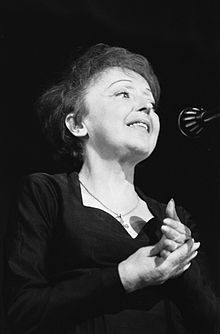Édith Piaf
| Édith Piaf | |
|---|---|

Piaf in 1962
|
|
| Born |
Édith Giovanna Gassion 19 December 1915 Belleville, Paris |
| Died | 10 October 1963 (aged 47) Plascassier, Grasse, France |
| Other names | La Môme Piaf (The Little Sparrow) |
| Occupation |
|
| Musical career | |
| Genres | |
| Instruments | Voice |
| Years active | 1935–1963 |
| Labels |
|
| Associated acts | |
| Signature | |
 |
|
Édith Piaf (French: [edit pjaf]; 19 December 1915 – 10 October 1963; born Édith Giovanna Gassion) was a French cabaret singer, songwriter and actress who became widely regarded as France's national , as well as being one of France's greatest international stars.
Her music was often autobiographical with her singing reflecting her life, and her specialty being chanson and torch ballads, particularly of love, loss and sorrow. Among her well known songs are "La Vie en rose" (1946), "Non, je ne regrette rien" (1960), "Hymne à l'amour" (1949), "Milord" (1959), "La Foule" (1957), "L'Accordéoniste" (1955), and "Padam ... Padam ..." (1951).
Since her premature death in 1963 and with the aid of several biographies and films including 2007's Academy Award winning La Vie en rose, Piaf has acquired a legacy as one of the greatest performers of the 20th century, and her voice and music continue to be celebrated globally.
Despite numerous biographies, much of Piaf's life is unknown. She was born Édith Giovanna Gassion in Belleville, Paris. Legend has it that she was born on the pavement of Rue de Belleville 72, but her birth certificate cites that she was born on 19 December 1915 at the Hôpital Tenon, a hospital located at the 20th arrondissement.
She was named Édith after the World War I British nurse Edith Cavell, who was executed for helping French soldiers escape from German captivity. Piaf – slang for "sparrow" – was a nickname she received 20 years later.
...
Wikipedia
